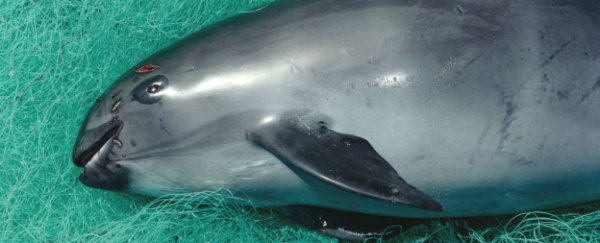In the Gulf of California, an innocent, once-flourishing animal is on the verge of disappearing from the world forever: a victim of nets, and the humans who lay them.
The vaquita, the world's smallest and most endangered cetacean, is almost gone. Last week, scientists announced only about 10 of these porpoises are left in the ocean, with their best estimates ranging between 6 and 22 individuals.
Tragically, the figure is almost certainly less.
On the very same day that researchers from the International Committee for the Recovery of the Vaquita (CIRVA) shared their numbers – based on an acoustic monitoring program conducted in 2018 – another casualty was announced.
Last Tuesday, conservationists with the marine wildlife organisation Sea Shepherd were on a routine patrol in a small vaquita refuge area in the northernmost tip of the gulf.
This tiny patch of water is the only place left on Earth that vaquitas swim, in the middle of a slightly larger zone where gillnets used for fishing are forbidden by law.
Despite that law, the Sea Shepherd crews encountered a hidden gillnet, along with the remains of an unidentified white animal that had died while caught in the illegal mesh.
Due to decomposition, the carcass couldn't be immediately identified, but an expert analysis later confirmed the body matched that of a vaquita porpoise.
That means we're dealing with about nine vaquitas left, then. Perhaps as few as five, based on the most recent scientific evidence.
Quite clearly, this is what an extinction emergency looks like.
"One of Earth's most incredible creatures is about to be wiped off the planet forever," says lawyer Sarah Uhlemann, the international program director at the US-based Centre for Biological Diversity.
"Yet Mexico has only made paper promises to protect these porpoises from deadly nets, without enforcement on the water."
While Mexico banned the use of gillnets in 2017, critics say it doesn't actually police the waters to make sure vaquitas are safe.
That responsibility falls to activists such as Sea Shepherd volunteers, who sail out into the gulf at night to search for the deadly gillnets – almost 400 of which were uncovered last year alone.
It's a dangerous crusade, exposing the environmentalists to fire-bombing attacks from the poachers who set the traps, working on behalf of organised criminal syndicates that illegally fish the waters.
"If we stop operations, the vaquita will go extinct," Sea Shepherd first mate Jack Hutton told Associated Press earlier in the month.
"We know we are going to keep getting attacked. We know we are risking our lives, but if we don't the vaquita has no chance."
Against this violent backdrop, the vaquita is just collateral damage. The fish the gangs are actually after is the totoaba, itself an endangered species endemic to the region.
Totoaba fish are highly prized in countries like China for supposed medicinal properties – a dangerous fetish that explains why the world's vaquita population basically halved in 2018.
When scientists first sounded the alarm on vaquitas, hundreds if not thousands still swam in the ocean. Now, campaigners are desperate to save the fraction of survivors remaining, who face no significant threat other than us and our inaction.
"There is only the tiniest sliver of hope remaining for the vaquita," says marine wildlife consultant Kate O'Connell from the Animal Welfare Institute.
"Mexico must act decisively to ensure that all gillnet fishing is brought to an end throughout the Upper Gulf."
The CIRVA findings are available here.
